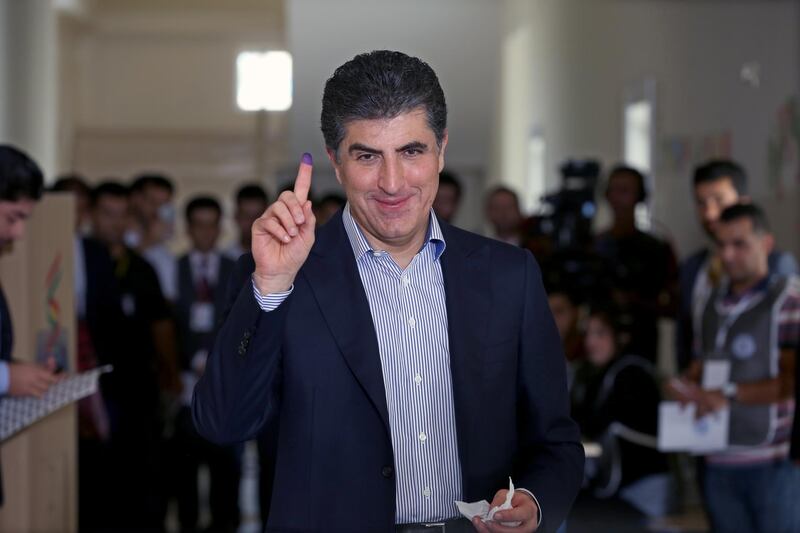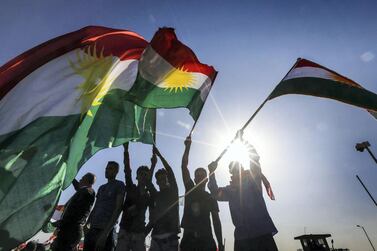The Iraqi Kurdish parliament elected on Tuesday Nechirvan Barzani to become president of the Kurdistan Regional Government, ending a two-year contentious political stalemate over the vacant post.
Mr Barzani, a prominent leader of the Kurdistan Democratic Party, is the nephew of former Kurdish president Masoud Barzani who resigned in November 2017 after a failed bid for independence from Iraq.
The controversial referendum backfired on Mr Barzani and sparked a crisis between Iraq’s Kurds and Baghdad.
Officials in Erbil see Nechirvan Barzani, who won 68 votes from the 81 politicians present, as the leader that will ease tensions with the central government and deliver stability.
The 52-year old Mr Barzani has served as prime minister of the KRG from 2006, his family and their KDP party have dominated Iraqi Kurdish politics for generations.
Since the early rounds of negotiations to form the KRG following last year's election, Mr Barzani has been the favourite for the presidency, no-one else was in the running, Lara Fatah, Kurdish and Iraq affairs analyst, told The National.
“I think most people are happy that after more than eight months the government is being formed,” she said.
"Although the economic situation in the KRG has improved over the last six months, many things have been delayed due to the negotiations. There is relief that things can now move on in earnest.
“In his position as prime minister, Mr Barzani has worked hard to rebuild bridges. Hopefully the good relations will now be solidified further.
Filling the seat of Kurdistan’s president puts the region back on track after the fallout of the independence vote, said Hiwa Afandi, the head of KRG’s Department of Information Technology.
“President Nechirvan Barzani is a heavyweight and seasoned statesman. His election will have positive internal, regional and international effects,” Mr Afandi said.
Mr Barzani has been a driving factor of political and financial stability in Iraq, Mr Afandi added.
Two opposition parties, the New Generation and the Patriotic Union of Kurdistan, boycotted Tuesday’s voting session due to rifts between the main political forces in the Kurdish region.
Both the KDP and PUK have traditionally brokered a power-sharing agreement for the Kurdish Regional Government.
Difficult tasks await Mr Barzani in dealing with Baghdad and handling the semi-autonomous region's internal issues, said Jangi Awakaly, a Kurdish official.
"Kurdistan's internal issues also need repairing as it has been damaged in the past between the various political parties," he said, adding that rebuilding trust between Baghdad and Erbil will be the most challenging.
But Mr Barzani's charismatic character has made him an excellent politician and earned him the respect of his opponents, Mr Awakaly said.
The vote by the Kurdish parliament has been long awaited and is a milestone in the region’s “bumpy political process” said Bayan Sami Rahman, the KRG’s representative to the US.
“The new president carries the people’s hopes at a time of multiple challenges,” Ms Rahman said.
Last December, the KDP nominated Mr Barzani to succeed his uncle as president of Iraqi Kurdistan. It also nominated Masoud Barzani’s son, Masrour, as premier of the regional government.
Mr Barzani is expected to nominate Masrour to succeed him as a regional prime minister.
Relations with the previous Iraqi administration of former prime minister Haider Al Abadi were strained by sanctions imposed by Baghdad’s central government following the independence referendum and federal troops were sent to push Kurdish forces out of oil fields vital for the region's economy.
But with the new Iraqi government led by Adel Abdul Mahdi, both Baghdad and Erbil have worked together to improve their relations.
“He will use his new position to further stabilise the region,” KRG IT head Mr Afandi said.
In February, the Kurdish parliament elected an interim speaker, Vala Fareed, nominated by the KDP and was confirmed in the post by 68 votes.
Ms Fareed became the first female speaker in Iraq’s Kurdistan region.
Since the US-led invasion that toppled Saddam Hussein in 2003 the Kurdish region has enjoyed a large degree of autonomy within Iraq.
Its forces, known as the Peshmerga, played a key role in the country’s defeat against ISIS.







